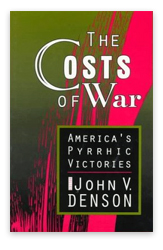Bombing Civilians: A Twentieth Century History. Edited by Yuki Tanaka and Marilyn Young. New York: The New Press, 2009, 291 pp. $30 (cloth)
How one feels about what one is reading can differ depending on where and when. Reading these essays while boarding a flight from Tokyo, transiting Hanoi and then arriving in Laos – all places that have been subjected to extensive U.S. bombing – is to feel the long arm of history tug at one’s conscience.
Some monks I met in Luang Prabang (Laos) recounted a recent journey to the Plain of Jars, a World Heritage sight. They said there are carefully marked paths with signs warning not to wander off because of unexploded ordnance in the area – cluster bombs dropped by the United States on a neutral country in a secret war that never happened. Estimates suggest that this insidious legacy of the bombings, which ended in the 1970s, has resulted in more than 20,000 Laotian casualties including many maimed children.
Rather than accusing, seeking vengeance or accountability, the monks calmly praised the very limited mine clearing efforts of U.S. veterans. They said they don’t feel anger; it was all a long time ago and would be of little importance if not for the continuing dangers.
This unsought absolution stirs a sense of incredulity about why the U.S. government has done so little to help a desperately poor country that it dragged into the maelstrom of the Vietnam War. This malign neglect also extends to Vietnam, where people continue to suffer from the dioxin residue left behind by extensive spraying of Agent Orange during the war.
Mark Selden argues that the U.S. has much to answer for in the indiscriminate bombing of civilians in Japan. We learn that Japan crossed that bridge itself in 1932 with the bombing of Shanghai, and Tetsuo Maeda details Japan’s bombing campaign against Congquing’s civilians from 1938.
Selden and colleagues are not out to exonerate the Japanese or privilege their suffering over what they inflicted on others. He is reminding us, though, that the U.S. systematically firebombed and gutted 66 Japanese cities in 1945 under flimsy excuses that these were primarily military targets.
The intention, however, was not solely a matter of zapping Japan’s factories and infrastructure. This aerial terror amounted to vengeance, payback for Pearl Harbor and mistreatment of prisoners of war, and was intended to inflict as much suffering on the civilian populace as possible.
July 1, 2009





